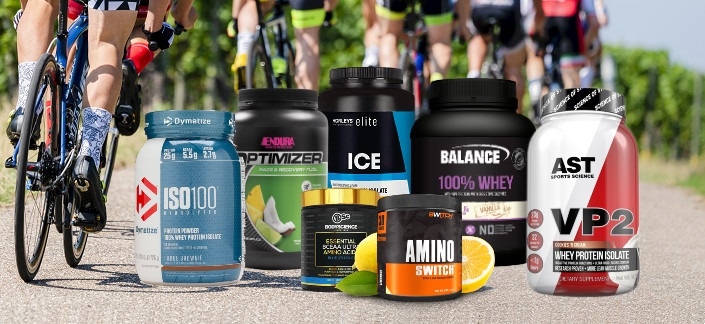How Much Protein for Endurance?

Few endurance athletes would argue that food is an important fuel source. Carbs, and to some degree fats, are needed to power energy cycles and keep you moving seamlessly through your training sessions toward your final goal.
There's no doubt that carbohydrates are important for restoring glycogen levels. And without enough glycogen, you can bet your morning coffee there's a wall heading for you sooner than you'd like during your next cardio session.
Or maybe your running more from fats as a fuel source, tapping into that innate beta-oxidation energy cycle and forging ahead with an alternative energy source.
Either way, there's no doubt that food provides us with the major macronutrients, whether they're fats or carbs or some combination, which are essential for all serious endurance athletes.

But is the food as fuel definition of food limited?
Carbohydrate-rich foods also contain fibre, essential for GUT heath and the beneficial bacteria that we depend upon within our digestive tract. And then there's the vitamins, minerals, phytochemicals and even water that some carb-rich foods offer our bodies.
 Sure carbs aren't essential nutrients, I.e., there is no established RDI for them because we can live without them. However, this isn't to say that they don't have inherent nutritional value.
Sure carbs aren't essential nutrients, I.e., there is no established RDI for them because we can live without them. However, this isn't to say that they don't have inherent nutritional value.
Fats on the other hand contain two essential fatty acids that we can't do without: Linolenic Acid (Omega 3) and Linoleic Acid (Omega 6). And if you're in the know when it comes to essential fats, you're already making a concerted effort to bump up the Omega 3 side of your dietary equation.
We need these fats to regulate inflammatory processes and provide structure to the fatty membranes of every single cell in the human body, among many other roles.
Fat and carb rich food sources do a heck of a lot more than provide substrate to run glycolysis and beta-oxidation energy cycles for some ATP molecules.
So foods are fuel for endurance athletes, but at the same time they have much more complex and varied roles to play.
And what about this macronutrient called protein?
Aren't protein shakes, steaks and lentil patties for that unruly pack of obsessive weight lifters called bodybuilders?

It turns out that protein and endurance performance is a poorly researched area when it comes to endurance athletes. Fortunately, with a dash of logic and a meta-analysis based on the limited studies available, a reasonable conclusion can be arrived at.
For more detailed information, head over to the Journal of the International Society of Sports Nutrition and check out their Position Stand paper on protein and exercise, published 2017.
There’s no doubt that over-eating protein and sacrificing carbs in the process is not gong to help you out in terms of endurance performance.
However, research does indicate that 0.25g of protein per kilogram of bodyweight per hour of exercise in addition to a standard carbohydrate intake reduces markers of muscle damage and subjective muscle soreness.
The type of protein here is paramount. If you are looking to ingest protein whilst engaged in endurance exercise, there are definitely some supplement differences worth noting.
The most ideal protein to try is a 100% hydrolysed whey protein isolate. This is because it is pre-digested and will be the least likely to cause gastric distress.
In addition, whey isolate offers an exceptional amino acid profile, with a high content of branched chain amino acids.
If you would prefer an amino acid supplement, go for a quality EAA (essential amino acid). Again, this is a pre-digested form of protein that rapidly exits the gut and enters the blood stream.
This exit the GUT strategy is important for any supplements taken during exercise. Ideally, we want rapid absorption and a high bioavailability.
If you've ever pushed it to the limit during training straight after a hamburger and fries, you'll know all about the importance of this.
It's never pleasant revisiting lunch a second time.
Though there may be little benefit from boosting your protein intake up beyond 1.5g/kg/day, it would be wise to save around 25 grams to take post-workout with your carbohydrate feed.
 Protein at this time helps neutralise the catabolic state that is attained during endurance training and kick-start tissue repair.
Protein at this time helps neutralise the catabolic state that is attained during endurance training and kick-start tissue repair.
If you want to use a protein supplement away from training simply for the sake of convenience, the sky is the limit these days as to which one you choose!
There are quality casein proteins, pea, rice, egg and even beef protein that deliver an abundance of amino acids and naturally occurring BCAAs.
Don’t get too concerned about bulking up on muscle either! After all, you’re not in the business of training for muscle bulk. And it takes a heck of a lot of stimulus through weight training to trigger muscle growth.
The extra protein will simply help with everyday bodily protein turnover and promote recovery of muscles, tendons and ligaments, among many other tissues.
In conclusion, it can be easy for endurance athletes to forget the benefits of protein, with their primary focus falling on fuel sources for training and competition.
However, protein does provide nine extremely crucial nutrients- the essential amino acids. With a little experimentation small amounts of well-timed and well-thought-out protein or amino acid supplements might just help you find a new groove during your next endurance session.









